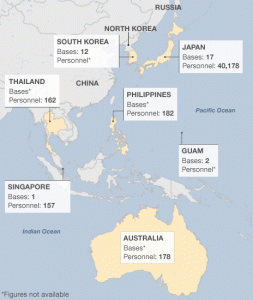By John Glaser,
June 06, 2012
Courtesy Of "Anti-War"
In tandem with the overall surge in military presence throughout Asia-Pacific, the U.S. is refurbishing long-abandoned World War II bases scattered across the Pacificfor potential use in the event of a major conflict with China.
“As part of the Air-Sea Battle concept,” reports Military.com, the U.S. is looking “to disperse its air forces stationed at its handful of major bases in the western Pacific in the event of a major conflict with China.”
The idea is to have enough U.S. bases peppered throughout the region so that China would be too surrounded to safely attack. “Doing so would make it more difficult for China to wipe out entire squadrons sitting on the ground with surprise attacks from its long range ballistic missiles.”
Last month, U.S. Marines rebuilt and restored the 8,000-foot runway at the abandoned North Field air base on the island of Tinian and subsequently engaged in a military exercise in coordination with nearby U.S. forces based in Guam.
Incidentally, the Tinian airbase is where the B-29s that dropped atomic bombs on Hiroshima and Nagasaki took off from in 1945.
The Obama administration’s so-called Asia pivot is an aggressive policy that involves surging American military presence throughout the region – in the Philippines, Japan, Australia, Guam, South Korea, Singapore, etc. – in an unprovoked scheme to contain rising Chinese economic and military influence.
This antagonistic posture has increased tensions between the U.S. and China as well as China and its weaker neighbors, like the Philippines. And U.S. preparations for a flare up with China are all the more troubling.
A recent report from the Center for Strategic International Studies predicted that next year “could see a shift in Chinese foreign policy based on the new leadership’s judgment that it must respond to a U.S. strategy that seeks to prevent China’s reemergence as a great power.”
“Signs of a potential harsh reaction are already detectable,” the report said. “The U.S. Asia pivot has triggered an outpouring of anti-American sentiment in China that will increase pressure on China’s incoming leadership to stand up to the United States. Nationalistic voices are calling for military countermeasures to the bolstering of America’s military posture in the region and the new U.S. defense strategic guidelines.”

No comments:
Post a Comment